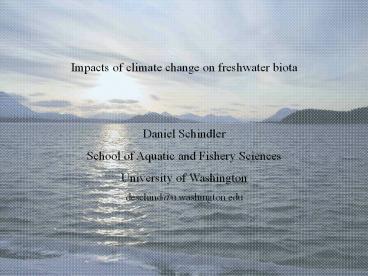Impacts of climate change on freshwater biota - PowerPoint PPT Presentation
1 / 40
Title: Impacts of climate change on freshwater biota
1
Impacts of climate change on freshwater
biota Daniel Schindler School of Aquatic and
Fishery Sciences University of Washington deschind
_at_u.washington.edu
2
Climate change
How will populations and ecosystems respond?
How might we move ahead despite scientific
uncertainties?
IPCC 2007
3
Lake Washington
4
Epilimnion water temperatureLake Washington, USA
5
Timing of Thermal StratificationLake Washington,
USA
Spring onset
Fall termination
Winder and Schindler, GCB (2004)
6
Timing of zooplankton spring peak
- Time of
- maximum
- density
7
Leptodiaptomus populations in Lake Washington,
USA
M. Winder et al., Limnology and Oceanography (in
press)
8
Leptodiaptomus life cycle shift in Lake
Washington, USA
Wavelet analysis
M. Winder et al., Limnology and Oceanography (in
press)
9
Life cycle shift in Leptodiaptomus
Production rates maintained despite declining
population size Temperature-driven life cycle
shift from a single cycle per year to two cycles
per year More erratic population
dynamics Recent collapse of population
10
(No Transcript)
11
Sue Johnson
Sue Johnson
12
(No Transcript)
13
Sockeye salmon life history
MARINE
FRESHWATER
carcasses
Adult sockeye (1-3 years)
spawning
eggs
fry
(1-2 years)
smolts
14
Wood River
20 km
15
In face of ongoing climate change, there is need
for coordinated climate and habitat policy
across a hierarchy of spatial and temporal
scales (international to local)
16
North American salmon catch relative to long-term
averages 1910-2005
Sensitive to low frequency climate shifts
(Coarse-scale climate filters)
Schindler et al., Fisheries (2009), update of
Mantua et al. (1997), data courtesy of S. Hare
17
Need to be especially vigilant about protecting
habitat during periods of high marine productivity
18
Bristol Bay, Alaska
19
(No Transcript)
20
Zooplankton production in Lake Aleknagik, Alaska
Jackie Carter
21
Schindler et al., unpublished
22
updated from Hilborn et al. (2003)
data from ADFG
23
Spawning
Embryo incubation
Juvenile rearing in lakes (1-2 years)
Smolt migration
Ocean residency (1-3 years)
Return migration
Adapted from Alexis Rockman painting, 1998 (L.A.
Rogers)
24
Biocomplexity and local adaptation
25
(No Transcript)
26
August 2000, NASA
27
Population diversity buffers variability
1.2
1.0
Coefficient of Variation
0.8
Wood River
0.6
Streams
Rivers
Bristol Bay
Increasing scale/complexity
28
Co-variation in annual returns to Bristol Bay
rivers and streams Populations are weakly
synchronous even at regional and local scales
median 0.46
median 0.22
(1956-2007)
29
Life history diversity further buffers variability
no age structure
1.2
1.0
Coefficient of Variation
0.8
age structure
0.6
Streams
Rivers
Bristol Bay
Increasing scale/complexity
30
- Biocomplexity and local adaptation
- Spatial/population and life history diversity
have buffering effects on variability in salmon
returns at local regional scales - Heterogeneity provides resilience via portfolio
effects
31
Threats to biocomplexity
32
Effect of variance-buffering from spatial and
life-history diversity on fishery management
(average return 30M, escapement goal10M)
33
Paleolimnology offers centennial scale
perspective
Lake sediments contain a biogeochemical archive
that reflects salmon abundance
recent deposition
time
34
Bristol Bay sockeye salmon production pre-historic
al versus today
Schindler, Leavitt, Finney, Gregory-Eaves
35
Other benefits of population diversity
36
(No Transcript)
37
Thermal heterogeneity in tributaries of the Wood
River system
24-h mean temperature (C)
Mean 24h temperature ( C)
Jonny Armstrong et al., in press (Ecology)
38
Aquatic habitat as a portfolio
Headwaters
Headwater Canyon
Montane Flood Plain
Montane Canyon
Piedmont Valley Flood Plain
Piedmont Canyon
Coastal Flood Plain
Stanford, J. A., M. S. Lorang, and F. R. Hauer.
2005. The shifting habitat mosaic of river
ecosystems. Verh. Internat. Verein. Limnol.
29123136.
Delta-Estuary
Processes cut and fill gw/sw plant succession
39
Habitat change at the Nyack Flood Plain of the
Flathead River, Montana 1945-2004
B
A
Whited et al.,2006. Ecology
40
Waiting for better climate science is a weak
strategy as uncertainties about ecosystem impacts
will always be large.
Need management/conservation schemes that are
robust to these uncertainties
Funding Gordon and Betty Moore Foundation,
National Science Foundation, Bristol Bay salmon
processors, UW-SAFS































